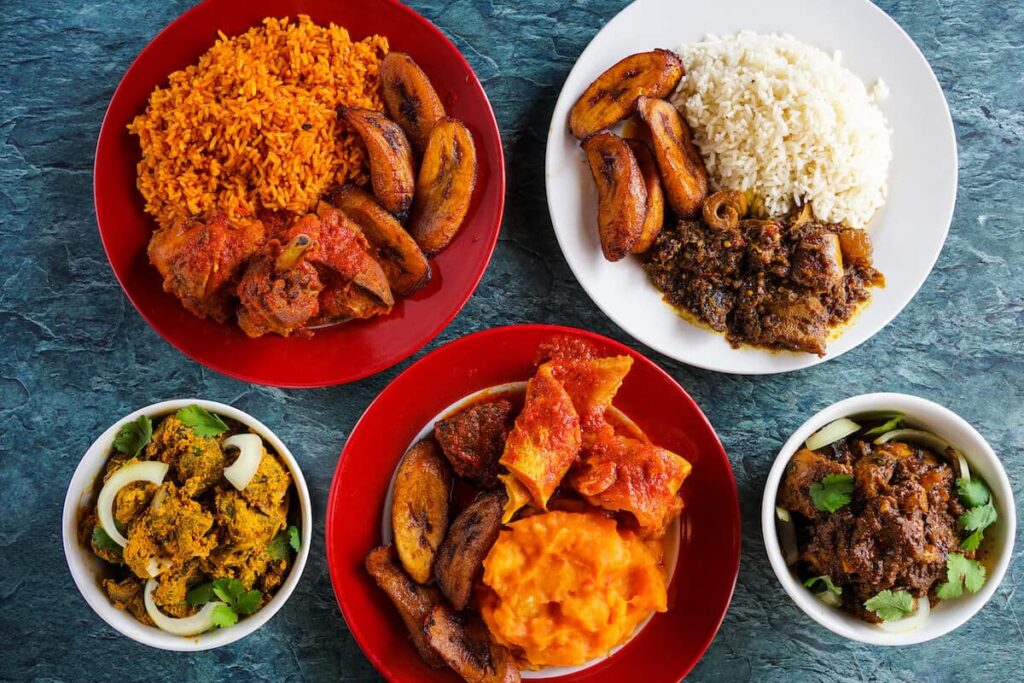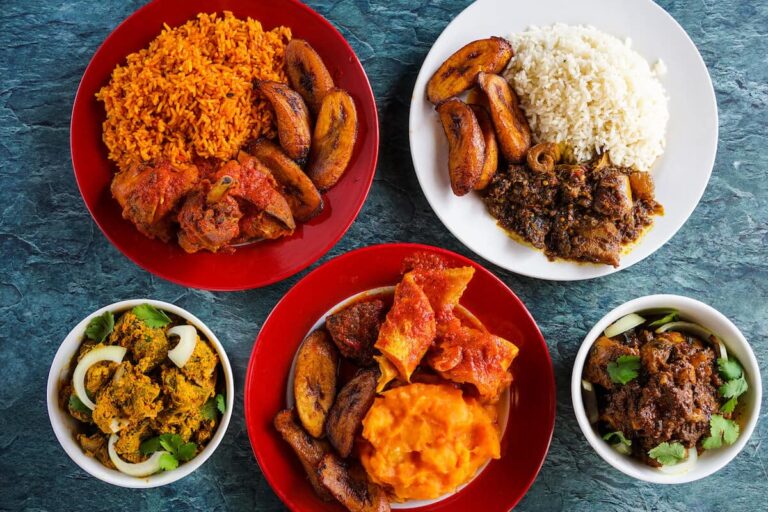From everyone here at Remitly—Merry Christmas to our customers in Nigeria and all around the world!
In Nigeria, Christmas is a time to put on fine new clothes and travel to spend time with family. Most Nigerian families start their joyous celebrations on Christmas Eve, and they last well into Christmas morning, when Christians attend church and then return home to celebrate more.
Remitly employee Amy L. recalls playing games like Ludo and AYO/NCHO during Christmas Eve growing up in Naija. “Christmas was more about us gathering as a family. Gift exchange wasn’t a huge part of our Christmas,” she says. “As kids, we looked forward to wearing new outfits and shoes for Christmas service.”
Along with Christmas clothes, enjoying a feast with friends and family is an important part of Christmas traditions in Nigeria as well. Amy remembers listening to the Nigerian Christmas song Mary’s Baby Boy Child by Boney M. as her family gathered and cooked up the Christmas feast.
One dish in particular stands out as a true Nigerian Christmas classic: Jollof rice. Here, we look closer at this delicious dish and examine a few special Jollof recipes by Nigerian cooks that you can try during your Christmas celebrations—no matter where you are during the festive season.
Christmas in Nigeria
In Nigeria, Christmas is a vibrant celebration marked by carols, Christmas trees, and joyful parades. People decorate their homes with Christmas lights, send out Christmas cards, and exchange gifts, blending traditional customs with holiday spirit. Families gather for festive meals, often featuring local delicacies alongside traditional Christmas dishes. Similar to Christmas traditions in India, the Nigerian festivities showcase a mix of cultural influences and religious significance, creating a unique and joyous holiday experience. Community events, such as church services and street fairs, further enhance the celebratory atmosphere, bringing people together in unity and joy.
Throughout the season, Yoruba and other ethnic groups in Nigeria join with loved ones in community gatherings and festivities. Firecrackers, and bangers light up the night, and elaborate Christmas decorations bring neighborhoods to life, honoring God and uniting people in celebration.
A central part of the Nigerian Christmas feast is jollof rice, a beloved dish shared among family and friends. Many attend church services to celebrate the birth of Jesus Christ, while Santa Claus, known locally as “Father Christmas,” visits children at events with gifts, adding to the excitement.
What is Jollof?
Jollof is a one-pot dish with many variations, enjoyed in Nigeria and other countries like Senegal, Guinea, Gambia, Sierra Leona, Liberia, and Ghana. Most feature long-grain white rice cooked with tomatoes, vegetables, meat, onions, and spices.
Preparing Jollof the traditional way involves cooking over an open flame, but many recipes allow you to cook it on a stovetop too. How you serve Jollof also matters. After you’ve spooned out the top, don’t discard the “socarrat” or “bottom pot,” the seemingly burned rice at the bottom of the pot—it’s often the most flavorful part of the batch.
Is Jollof rice Nigerian or Ghanaian?
Jollof is a rice dish that originated in Western Africa. Its exact birthplace is a controversial topic, though.
Historians have traced the dish back to the Wolof, or Jolof, Empire, which ruled the Senegambia region of West Africa from the 14th to the 16th century. The dish grew popular across the region and is believed to have influenced the Cajun dishes of jambalaya and gumbo as well.
Since a number of modern-day African countries were a part of this region, there’s a lot of debate about which country is the true birthplace of the dish. In 2014, the #JollofWars broke out on Twitter between Ghanaians and Nigerians as Africans argued over the true inventors of Jollof.
While we may never be able to say for certain whether Jollof is Nigerian or Ghanaian, it’s clear that this dish is integral to the culture of both countries—and to people of Nigerian and Ghanaian ethnicity living in other parts of the world.
In the US, there’s a Jollof Festival where chefs participate in culinary battles to see who can create the tastiest version. Attendees get to try it all and then vote on the winner. FreemeTV also put out an EP of holiday music called “A Jollof Christmas,” you can find it on Spotify to play while you prepare Jollof for your own Christmas meal.
What does Jollof taste like?
Jollof typically has a smoky taste with slightly acidic, sweet notes due to the tomatoes. Many people add chili powder, habanero peppers, or scotch bonnet peppers to bring some heat to the dish. Of course, you can also put bell peppers into the mix to keep things mild.
What is the secret ingredient in Jollof rice?
The secret ingredient that gives the Nigerian fried rice its bright red color is the tomatoes. Recipes that call for tomato paste tend to be the brightest.
You can purchase a high-quality, store-bought paste or make your own to get the color of Jollof just right.
What are the best spices for Jollof rice?
The best spices for Nigerian fried rice rice are the ones that please your palate. Some commonly used in Jollof include:
- Allspice
- Bay leaf
- Cayenne or black pepper
- Chili powder
- Coriander
- Cumin
- Curry powder
- Garlic
- Ginger
- Nutmeg
- Onion or onion powder
- Thyme
- Turmeric
What do you serve with Jollof?
While fried rice can easily be a main course, it’s often served as a tasty side dish in Nigeria. If you want to add some more Nigerian flavor to your Christmas Day meal, add some of these other dishes to your table:
- Dodo: Nigerian plantains that can be fried, grilled, or boiled
- Nigerian salad: A vegetable salad similar to coleslaw that contains cabbage, carrots, and mayonnaise or salad cream
- Pounded yam: A popular dish that consists of Puna yam boiled, pounded, and rolled into balls, often eaten with a stew or soup
- Protein: Chicken, ram, beef, and goat are all popular choices of protein eaten during the Christmas season
- Peppered snail: One of the most popular Nigerian snacks to eat with rice dishes, an appetizer of snails served on a skewer and topped with a spicy pepper sauce
Jollof rice recipes for a Nigerian Christmas dinner
There is no single way to make Nigerian fried rice. From home cooks to executive chefs, everyone who whips up a batch of the traditional Jollof takes their own approach when it comes to ingredients, spices, and methods. A perfect plate of Jollof is one that your family members love to eat—a meal special enough for the holiday season.
To set you off on your own Jollof journey and warm up your December, we’re serving up four unique Christmas time recipes—try one as written, or draw inspiration from each one to create your own recipe.
Awaken your palate with Chef Tunde Wey’s spicy Jollof
For Chef Tunde Wey, mastering Jollof is all about seeking a balance between smoky and spicy and getting every grain of rice to just the right consistency. “It is a fun dish to make, but it requires some practice to get it exactly right,” he explains on his blog. “The perfect plate of Jollof rice must be slightly smoky, deeply flavored, al dente, and bright red. It’s a challenge but definitely worth it!”
Get Tunde Wey’s Jollof Rice recipe on AramcoWorld
Wey was born in Nigeria and then moved to the US when he turned 16. As a chef, he’s especially interested in the connections between food and culture. He’s gained fame for his traveling dinner series, which allows diners to literally get a taste of history and cultural experiences.
Called “From Lagos,” his first tour highlighted traditional Nigerian cuisine while exploring the political and socioeconomic challenges facing his birthplace. His second tour, “Blackness in America,” is meant to spark conversations about what it is like to be Black in the U.S. and how the Black experience is reflected in food.
With his recipe for Jollof, Wey brings plenty of traditional flavor from spices like turmeric, ground coriander, cumin, allspice, African dried chili, ginger, thyme, and bay leaves. Although his technique is complex, he provides some troubleshooting tips for cooks who end up with rice that is too wet or too dry, making the recipe accessible to beginners.

Enjoy Jollof in less than an hour with Chef Immaculate Ruému’s quick Jollof
Chef Immaculate Ruému proves a traditional Jollof doesn’t have to mean hours spent in the kitchen. Her recipe is a great choice for those pressed for time during the holiday season. This recipe is one of many that Ruému has developed during her career. She constantly comes up with new twists and even has an extra-quick version of the dish made with jarred pasta sauce.
While explaining her love of experimentation, she says, “As a Nigerian, I can say that aside from the taste and flavor, a beautiful thing about the Nigerian Jollof rice dish is how it varies.”
Get Chef Immaculate Ruému’s Classic Nigerian Jollof Rice on her blog
Experimental recipes are a cornerstone of Ruému’s work, and it seems her life story inspires her. She was born in Nigeria and then completed her Michelin training in London. Today, she works in Milan as a private chef, creating fusion meals incorporating elements of Nigerian, Italian, and other cuisines.
From start to finish, Ruému’s Jollof takes only 45 minutes to complete. A food processor handles the ingredient prep and blending in one simple step, and her instructions make cooking the rice to the right consistency virtually foolproof.
Turn any meal into a celebration with Eleanor Ajoku Henry’s festive Jollof
Blogger Eleanor Ajoku Henry doesn’t wait until the holidays to prepare her Jollof. For her, the traditional dish is a way to bring a joyful, celebratory mood into a meal. Over the years, she has perfected her method of packing the smokey flavor she’s accustomed to into the dish.
She says, “Most people feel the unique taste comes from preparation using firewood, but that isn’t always necessarily the case. For me, it’s impossible to make rice with firewood, since my apartment complex doesn’t necessarily allow one to grill, let alone smoke anything. But [my] recipe comes close to the wonderful taste of party Jollof without any firewood.”
Get Eleanor Ajoku Henry’s Jollof Rice Recipe on her blog
Ajoku was born in Igbo, Nigeria, and moved to the US when she was a teenager. She holds a degree in chemical engineering from the University of Toledo. While she was in college, she began recording podcasts and blogging as a way of self-discovery. Her honest, insightful posts and episodes struck a chord with many people her age, turning her reflective project into a career. On her blog, she covers everything from food to professional development to wellness.
For her recipe, Ajoku includes traditional spices plus Knorr or Maggi bouillon cubes for extra flavor. She warns that her dish brings the heat and advises readers to adjust the ingredients as needed. Her take on Jollof also includes optional crayfish for those who want to make their meal even heartier.

Make it a meatless holiday with Afia Amoako’s vegan Jollof
Traditionally, Jollof isn’t vegan, but Afia Amoako has changed that with her version of the traditional dish. She created her recipe to continue to enjoy one of her favorite foods without sacrificing her commitment to an animal-free diet.
Her love for the dish is apparent, as she says, “Jollof Rice has a special place in my heart! If someone asked me what meals I will live on for the rest of my life, I will say Oatmeal and Jollof Rice. I think it is the perfect way to prepare rice; it is absolutely fragrant, rich in color with different texture.”
Get Afia Amoako’s Vegan Jollof Rice Recipe on her blog, The Canadian African
Afia Amoako was born in Ghana but has since moved to Canada, where she is a full-time doctoral student in epidemiology. She began food blogging after going vegan. When she first made the change, she found that one of the most difficult parts of giving up meat, seafood, dairy, and eggs was going without the foods that reminded her of home. This led her to come up with vegan versions of traditional West African dishes and to share the delicious results.
Amoako’s recipe uses veggie bouillon. She also includes a few unique spices like rosemary and the Indian spice garam masala. In addition to the recipe, she provides tips on how to modify the dish and choose the right pot to prepare the meal.
FAQs
Jollof rice is a festive dish shared among family and friends, symbolizing togetherness and celebration during Christmas. It’s an essential part of the Nigerian holiday feast, enjoyed with traditional music and gatherings.
ollof rice originated in West Africa, specifically tied to the Wolof Empire in the Senegambia region. However, countries like Nigeria and Ghana claim it as their own, leading to the friendly “Jollof Wars” debate over which nation makes the best version.
Yes, the U.S. hosts Jollof Festivals, where chefs compete to make the best Jollof rice, allowing attendees to sample and vote for their favorite. The dish’s popularity highlights its cultural importance among West African communities abroad.

